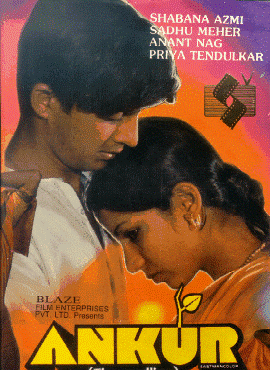
ANKUR
India, 1971, 131 minutes, Colour.
Shabana Azmi, Sadhu Meher.
Directed by Shyam Benegal.
Indian director, Shyam Benegal's film received general release throughout the world. Ankur has a contemporary setting and illustrates some of the social problems of contemporary India. It highlights the landowners and their well educated children who are as oppressive as, for example, squires' sons were in the 18th and 19th centuries in England. There seem to be plot parallels here. The film also has an atmosphere of the Indian countryside, social conditions, religious customs.
Benegal's Junoon, on the other hand, is a historical film and shows the atmosphere of the Indian Mutiny of 1785. The film takes an Indian point of view and covers a wide canvas. Clashes between Hindus, Muslims and Christians are highlighted. But the main clash is with the British. Their transported way of life is shown as well as the eruption of Indian anger into that governing way of life. Many scenes are brutal. The film is an Indian historical pageant - and suffers by comparisons with western versions of the same material or similar material. The film becomes melodramatic, highlights the heroics, has a musical score which emphasizes this. It is slow-moving at times and then rushes with action scenes. It relies very much on conventions. The leads are Shashi Kapoor and his wife Jennifer Kendall. As an example of big budget Indian film-making, Junoon is interesting and highlights aspects of the Indian film industry.
1. The quality of Indian cinema? Themes? Ways of communicating to audiences? the Indian audience? Worldwide audiences? Dramatic impact, pace?
2. The establishing of the setting, the religious ceremony at the beginning? The delineation of social situations in city, countryside? The students and the effect of education? An educated class, western manners, leisure, competitiveness? The sons of the landowners and their presumptions about their place in life? The contrast with the poor?
3. The focus on the student, his getting his degree, his relaxed attitudes with his friends, the long marriage sequence and the fact that his bride was too young to consummate the marriage? His driving his car through the village and needing help, it emerging that he was spoilt? His capacity for work, for learning? The drawbacks of his arrogance?
Expectations of his father? The encounter with Lakshi? Her husband? her working on the farm, in the house? her leading him on? His taking her, her husband's departure, her pregnancy and her fears? His father and decisions and pressures? Witnessing the court case about adultery and divorce? Penalties for the wife? His own wife arriving and Lakshi running away? Her discovering her husband and their return, the student beating the deaf mute? 11tis being left alone with his wife? The portrait of an arrogant young man, arrogant behaviour, the possibility of tenderness, his fears?
4. Lakshi as heroine: her work on the farm, her place in traditional Indian society, her relationship with her husband and his saving her, his drinking? her story? her planning to go into the student's house? Her leading him on, smile, etc.? Her pregnancy and her fears? The impact of the court case and her fears? The spurning of the wife? her wanderings, encountering her husband, reconciliation, his being beaten and her resentment against the student? Portrait of a heroine bound by society, trying to be an individual, a woman in Indian society?
5. The portrait of Lakshi's husband - deaf mute, kind and understanding, drinking, going away? The encounter again, his forgiveness, his being beaten?
6. The father and his wealth, expectations. pressure on his son, lack of esteem for him, his arrival and judgment on what his son had achieved? The film's comment on the older generation and their pressures on the younger generation?
7. The portrait of people, the police, the crowds in the village, those who worked on the farm, the people in the court case?
8. How well did the film sketch in details of the Indian way of life, homes, manners, work? The sequences of work in the fields?
9. India and social conditions, the needs of the people, the Rajahs and the land, their arrogance, using people? The necessity for the overthrow of the old social system? The revolutionary aspects of the film - critique of the ruling class?
10. Insight into India, into human nature? how well shared with the audience?